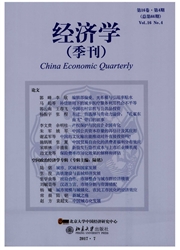
欢迎您!东篱公司
退出

 中文摘要:
中文摘要:
本文发现1958年两个重要的政策变化导致了粮食主产区的饥荒:工业“大跃进”和粮食“包干制”。在大跃进的背景下,包干制诱导粮食主产区在正常年份通过高征购发展本地工业,当面临1959年和1960年粮食连续减产时,这些地区遭受饥荒的冲击也越大。本文利用历史数据证实了上述假说,工业化进程越快的地区的粮食销售也越多,对本地粮食的征购也越彻底,进而死亡率也越高,并且这些效应在饥荒年份更加明显。
 英文摘要:
英文摘要:
In this paper, we find that the changes of two related policies in 1958, i. e. , the "great leap forward" and the "grain contracting system", lead to the Chinese great famine of 1959--1961 in grain abundant areas. Using provincial data from 1954 to 1966, we also find that the provinces with industrialization sell more grain, their grain procurement and death rates are higher, and all these coefficients are only significant in the famine vears.
 同期刊论文项目
同期刊论文项目
 同项目期刊论文
同项目期刊论文
 期刊信息
期刊信息
